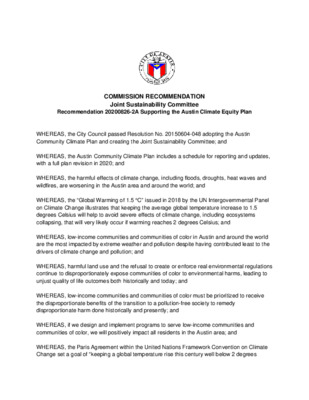JSC Recommendation — original pdf
Backup

COMMISSION RECOMMENDATION Joint Sustainability Committee Recommendation 20200826-2A Supporting the Austin Climate Equity Plan WHEREAS, the City Council passed Resolution No. 20150604-048 adopting the Austin Community Climate Plan and creating the Joint Sustainability Committee; and WHEREAS, the Austin Community Climate Plan includes a schedule for reporting and updates, with a full plan revision in 2020; and WHEREAS, the harmful effects of climate change, including floods, droughts, heat waves and wildfires, are worsening in the Austin area and around the world; and WHEREAS, the “Global Warming of 1.5 °C” issued in 2018 by the UN Intergovernmental Panel on Climate Change illustrates that keeping the average global temperature increase to 1.5 degrees Celsius will help to avoid severe effects of climate change, including ecosystems collapsing, that will very likely occur if warming reaches 2 degrees Celsius; and WHEREAS, low-income communities and communities of color in Austin and around the world are the most impacted by extreme weather and pollution despite having contributed least to the drivers of climate change and pollution; and WHEREAS, harmful land use and the refusal to create or enforce real environmental regulations continue to disproportionately expose communities of color to environmental harms, leading to unjust quality of life outcomes both historically and today; and WHEREAS, low-income communities and communities of color must be prioritized to receive the disproportionate benefits of the transition to a pollution-free society to remedy disproportionate harm done historically and presently; and WHEREAS, if we design and implement programs to serve low-income communities and communities of color, we will positively impact all residents in the Austin area; and WHEREAS, the Paris Agreement within the United Nations Framework Convention on Climate Change set a goal of “keeping a global temperature rise this century well below 2 degrees Celsius above pre-industrial levels and to pursue efforts to limit the temperature increase even further to 1.5 degrees Celsius”; and WHEREAS, current international, federal, state and local commitments to greenhouse gas reduction fall short of what is needed to keep average global warming to either 1.5 or 2 degrees Celsius and the UN Intergovernmental Panel on Climate Change’s “Emissions Gap Report 2019” illustrates the significant magnitude in the gap between international commitments and needed emissions reductions; and WHEREAS, the City of Austin is a member of C40 Cities, a network of global cities committed to addressing climate change; and WHEREAS, C40 Cities has developed guidance for cities on setting greenhouse gas reduction goals that are based in science and equitable in the global context, and according to that methodology, Austin should follow a steep decline curve to net zero greenhouse gas emissions; and WHEREAS, recent reports by the UN Intergovernmental Panel on Climate Change indicate that significant negative emissions - capturing and sequestering carbon dioxide from the air - will be needed to avoid a climate change effects that would be very difficult or impossible for societies to cope with; and WHEREAS, reducing greenhouse gas emissions results in many co-benefits, including reduced air pollution and respiratory diseases, improved access to transportation, reduced energy costs, job creation, and greater access to green spaces, which improves physical and mental well- being, and most of these benefits are established as priority outcomes in the Austin Strategic Direction 2023; and WHEREAS, the Joint Sustainability Committee, the Office of Sustainability and the Equity Office worked collaboratively to assemble a diverse team of Austin community members and an equitable process for engaging the community to develop the Austin Climate Equity Plan, an update to the Austin Community Climate Plan; and WHEREAS, the Austin Climate Equity Plan was created by a collaboration of 120 community members and 24 City staff, with additional community input provided by over 50 interviews conducted by 24 climate ambassadors and over 250 attendees at five community workshops; and WHEREAS, the Austin Climate Equity Plan was developed as an intentionally anti-racist plan that aims to be a step toward achieving racial equity in the Austin community; and WHEREAS, successful implementation of the Austin Climate Equity Plan will depend on focused attention from the City Council and other City leadership, adequate funding, guidance from community advisory bodies and continued engagement with the broader Austin community; NOW, THEREFORE, BE IT RESOLVED THAT THE JOINT SUSTAINABILITY COMMITTEE OF THE CITY OF AUSTIN recommends that the Austin City Council move as quickly as possible to: 1. Adopt the Austin Climate Equity Plan, including: a. A goal to follow the steep decline curve described in the plan to net-zero community-wide greenhouse gas emissions by 2040, followed by negative emissions; and b. Allowing for the use of carbon offsets to meet up to 10 percent of annual emissions goals to follow the steep decline curve, as described in the plan; 2. Direct the city manager to work with the Office of Sustainability, Equity Office, and a working group of Austin residents to develop implementation plans, with budgets, schedules, leaders, and participants identified, to fully implement the Austin Climate Equity Plan to be presented as part of the fiscal year 2021/2022 budget; 3. Create a new Council Committee on Environmental Justice to provide leadership on these topics and to oversee implementation of and future updates to the Austin Climate Equity Plan; 4. Adopt an ordinance to update the bylaws for the Joint Sustainability Committee to add five additional members to the committee from the Austin community, appointed by City Council. Record of the vote: Motion to approve by Commissioner White, second by Commissioner Coyne. Motion passes 10 approve, 0 opposed, 0 abstained. Date of approval: August 26, 2020 Attest: __________________________________ Zach Baumer, Liaison Zach Baumer